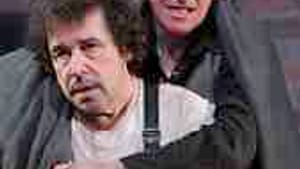Stay in the Loop
BSR publishes on a weekly schedule, with an email newsletter every Wednesday and Thursday morning. There’s no paywall, and subscribing is always free.
A coupla white dudes sitting around talking
Sam Shepard's "Ages of the Moon' in New York

With the publication of his new collection of short stories, Day Out of Days, a revival of A Lie of the Mind about to open in New York, and Ages of the Moon, just transferred to New York from the Abbey Theatre in Dublin, Sam Shepard is clearly back. This is not the return of "the rock 'n' roll Jesus with a cowboy mouth" who blazed across the off-Broadway sky 40 years ago, but an author in later middle age, in a meditative mood, ruminating on life, hilariously and painfully.
Stephen Rea and Sean McGinley, for whom Ages of the Moon was written, play two beat-up geezers who might be Waiting for Godot's Gogo and Didi with hick accents. Or they might be Austin and Lee of Shepard's True West, grown older. There's a porch, a shotgun, a bottle of bourbon, and Ernest Tubb is singing "Have You Ever Been Lonely?" What a setup.
Shepard has always loved lighting effects: bang up to blackout. In Ages of the Moon, the set directions call for the play to begin "in bright noon sunlight of late summer and gradually fall[ing] off into dusk and then into black night with full moon effect occurring slowly like a stripe of white light, gradually narrowing to a knife's edge by end of play." This reads better than it looks in the Atlantic Theatre, but in either case, this is classic American dramatic metaphor— a long day's journey into night if ever was one.
Midnight phone call
Ames (Rea with his sadsack eyes and straw hair) is "Banished…. exiled. Never to return no more, no more," since his wife found a note written by an instantly forgotten girl. He's heartbroken and desperate, and has called his old friend Byron (McGinley) in the middle of the night to come visit. And so they talk— about love, about women, about sex, about times gone by.
Their vocabulary is occasionally startling: "alacrity," "milieu," "happenstance." Memory and fiction blur— no telling at this point what really happened, what didn't.
Byron, referring to the cabin as Ames's "little refuge," remarks: "Made in the shade if the tree don't fall."
"What?"
"The tree."
"What tree?"
"Not these trees. It's metaphorical…."
Falling down, propping up
The two friends sit and wait for the eclipse of the moon, promised by the Field Guide to the Night Sky. Despite Ames's declaration that he's not accustomed to "Something meaning something else," this eclipse is clearly metaphorical.
The actors have the rhythm of this dialogue down pat— just as they've perfected the rhythm of their awkward old-guy wrestling, arguing, falling down and propping up (J. David Brimmer, fight consultant). By the play's end, only 80 minutes later, the Beckett moment is complete: "We gotta do something, Byron…. What are we gonna do, Byron?" and Byron replies, "There's nothing to do."
The final tableau is as moving as anything, knockoff or not. The curtain music, with Ernest Tubb singing, "I'd Waltz Across Texas With You" pretty much sums up how completely I fell for this play.
Stephen Rea and Sean McGinley, for whom Ages of the Moon was written, play two beat-up geezers who might be Waiting for Godot's Gogo and Didi with hick accents. Or they might be Austin and Lee of Shepard's True West, grown older. There's a porch, a shotgun, a bottle of bourbon, and Ernest Tubb is singing "Have You Ever Been Lonely?" What a setup.
Shepard has always loved lighting effects: bang up to blackout. In Ages of the Moon, the set directions call for the play to begin "in bright noon sunlight of late summer and gradually fall[ing] off into dusk and then into black night with full moon effect occurring slowly like a stripe of white light, gradually narrowing to a knife's edge by end of play." This reads better than it looks in the Atlantic Theatre, but in either case, this is classic American dramatic metaphor— a long day's journey into night if ever was one.
Midnight phone call
Ames (Rea with his sadsack eyes and straw hair) is "Banished…. exiled. Never to return no more, no more," since his wife found a note written by an instantly forgotten girl. He's heartbroken and desperate, and has called his old friend Byron (McGinley) in the middle of the night to come visit. And so they talk— about love, about women, about sex, about times gone by.
Their vocabulary is occasionally startling: "alacrity," "milieu," "happenstance." Memory and fiction blur— no telling at this point what really happened, what didn't.
Byron, referring to the cabin as Ames's "little refuge," remarks: "Made in the shade if the tree don't fall."
"What?"
"The tree."
"What tree?"
"Not these trees. It's metaphorical…."
Falling down, propping up
The two friends sit and wait for the eclipse of the moon, promised by the Field Guide to the Night Sky. Despite Ames's declaration that he's not accustomed to "Something meaning something else," this eclipse is clearly metaphorical.
The actors have the rhythm of this dialogue down pat— just as they've perfected the rhythm of their awkward old-guy wrestling, arguing, falling down and propping up (J. David Brimmer, fight consultant). By the play's end, only 80 minutes later, the Beckett moment is complete: "We gotta do something, Byron…. What are we gonna do, Byron?" and Byron replies, "There's nothing to do."
The final tableau is as moving as anything, knockoff or not. The curtain music, with Ernest Tubb singing, "I'd Waltz Across Texas With You" pretty much sums up how completely I fell for this play.
What, When, Where
Ages of the Moon. By Sam Shepard; directed by Jimmy Fay. Abbey Theatre of Dublin production through March 7, 2010 at the Atlantic Theater, 336 West 20th St. (between Eighth and Ninth Aves.), New York. (212) 279-4200 or www.atlantictheater.org.
Sign up for our newsletter
All of the week's new articles, all in one place. Sign up for the free weekly BSR newsletters, and don't miss a conversation.
 Toby Zinman
Toby Zinman